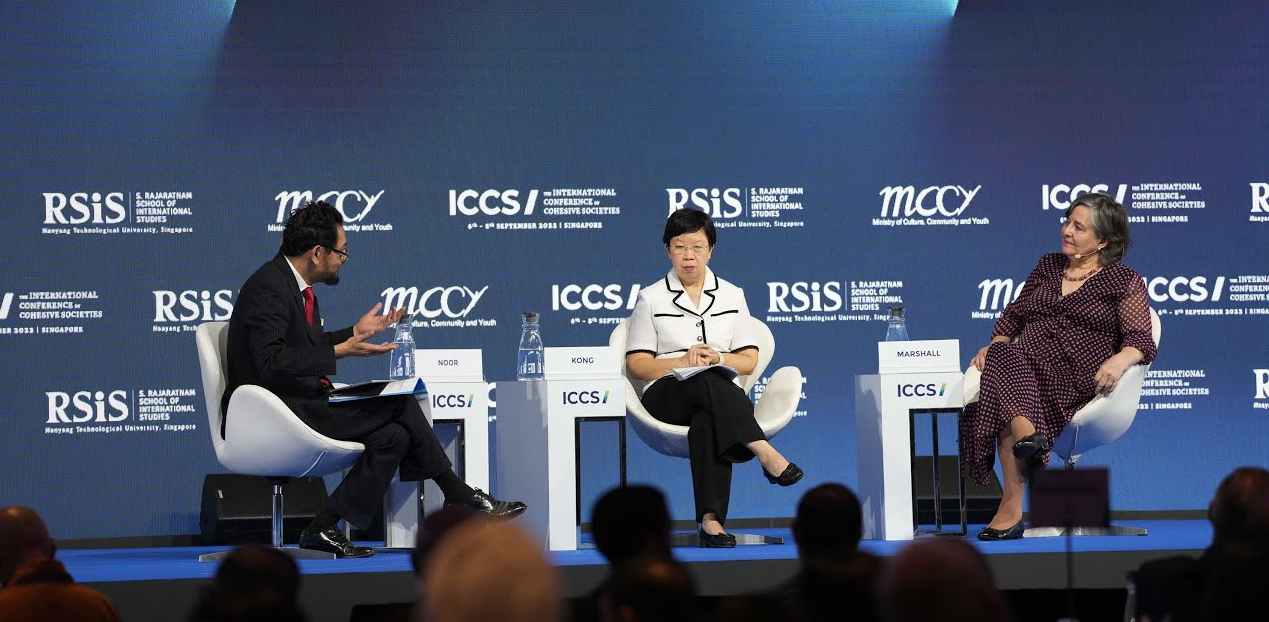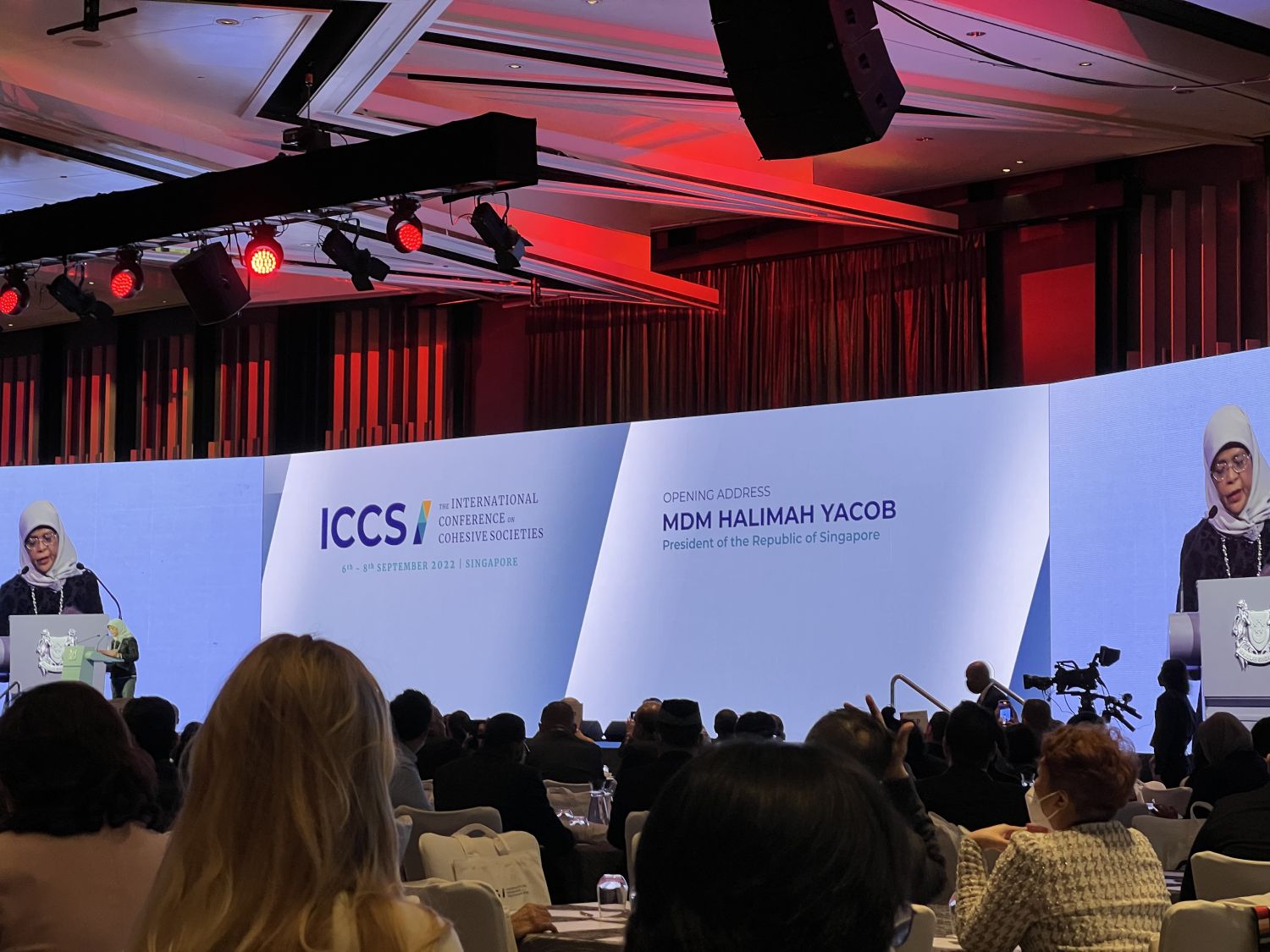DDM Global News
Venerable Chang Ji attended the 2nd International Conference on Cohesive Societies in Singapore on behalf of Dharma Drum Mountain Abbot President
 Due to the impact of the COVID-19 pandemic, it was three years after its first celebration that the 2nd International Conference on Cohesive Societies (ICCS) was organized from September 6 to 8, 2022 at Raffles City Convention Centre in Singapore. At the invitation of Nanyang Technological University's S. Rajaratnam School of International Studies (RSIS), Venerable Chang Ji, Dharma Drum Mountain Buddhist Association Representative to the United Nations, took part in the ICCS on behalf of Venerable Guo Huei, Dharma Drum Mountain Abbot President. 800 delegates from about 40 countries around the world, including 120 youth leaders and more than 50 speakers, gathered at the conference-- whose theme is "Confident Identities, Connected Communities"-- to discuss and dialogue on themes of faith, identity, and cohesion.
Due to the impact of the COVID-19 pandemic, it was three years after its first celebration that the 2nd International Conference on Cohesive Societies (ICCS) was organized from September 6 to 8, 2022 at Raffles City Convention Centre in Singapore. At the invitation of Nanyang Technological University's S. Rajaratnam School of International Studies (RSIS), Venerable Chang Ji, Dharma Drum Mountain Buddhist Association Representative to the United Nations, took part in the ICCS on behalf of Venerable Guo Huei, Dharma Drum Mountain Abbot President. 800 delegates from about 40 countries around the world, including 120 youth leaders and more than 50 speakers, gathered at the conference-- whose theme is "Confident Identities, Connected Communities"-- to discuss and dialogue on themes of faith, identity, and cohesion.The 3-day program featured three special addresses, three plenary sessions entitled "How Faith Can Bridge Divides", "How Diversity Can Be Harnessed for the Common Good" and "How Technology Can Be Leveraged to Foster Mutual Trust", and nine breakout sessions. Regarding participation in the plenary session "How Faith Can Bridge Divide", Venerable Chang Ji shared some key points she summarized from the panelists' discussion as follows: during the COVID-19 pandemic, the gulf of understanding between different ideologies, religious beliefs, and cultures has widened. As a result, dialogues and gatherings are vital to generating greater understanding and fostering respect among communities. Through compassion, the universal value that can bind society together, we can not only bridge our differences, but also better handle the challenges we mutually face as fellow humans during the pandemic. "Humanity Matters", a Singapore community that brings people of different faiths working together, side by side, to provide local and regional pandemic and disaster relief, is a good example.
During the plenary session "How Diversity Can Be Harnessed for the Common Good", participants discussed the way diversity can be harnessed for the common good, with the core value being mutual trust and respect. We must treat each other with the same dignity and freedom that we enjoy ourselves. Dialogue, education, shared goals, and actions can bring faith and non-faith groups alike together, to work on the UN's Sustainable Development Goals such as global food security and climate change issues, both of which cut across national boundaries and are not particular to any race or religion.
At the 3rd plenary session "How Technology Can Be Leveraged to Foster Mutual Trust", panelists were invited to give their views on how can people nowadays employ digital platforms, which can either create echo chambers or be used for divisive ends, to promote social cohesion. They indicated that during the pandemic, technology can bring people together across vast distances, thereby allowing people to connect with one another. Through technology, a lot of information can be conveyed in a positive way. At the same time, technology can also spread misinformation and hate speech. However, technology itself is value-neutral. It is completely neutral in the sense that much depends on the user and how for what ends they utilize the technology. With mutual trust, we can use technology as a truly powerful and positive enabler for social change. In addition, with the right approach, we can transform the digital space into a catalyst for building cohesive societies and foster a greater sense of unity, trust, and respect between communities.
 The 2nd International Conference on Cohesive Societies drew much attention from international political and thought leaders, religious groups, and youth representatives. Mdm Halimah Yacob, current President of Singapore, personally presided over the opening ceremony of the conference. Representatives of such diverse religious groups as Buddhism, Sikhism, Catholicism, Christianity, Judaism, Islam, Hinduism, and Taoism, etc. were also present.
The 2nd International Conference on Cohesive Societies drew much attention from international political and thought leaders, religious groups, and youth representatives. Mdm Halimah Yacob, current President of Singapore, personally presided over the opening ceremony of the conference. Representatives of such diverse religious groups as Buddhism, Sikhism, Catholicism, Christianity, Judaism, Islam, Hinduism, and Taoism, etc. were also present.ICCS, with a mission to build a culture of cohesion in societies, was first held in Singapore in 2019. Invited by Singapore Ambassador Wang Jingrong, Executive Vice Chairman of the S. Rajaratnam School of International Studies, DDM Abbot President Venerable Guo Huei attended the 1st ICCS as a representative of Chinese Buddhism, and delivered a speech on the topic of "Religious Faith and World Peace". In November 2021, Venerable Chang Ji also published the paper "Religious Communities and Climate Change: Four Ways to Coherence" on behalf of Dharma Drum Mountain, which was published in the RSIS Journal and served as conference proceedings of the 2022 ICCS.
Text: YKL
Photos: Venerable Chang Ji
Translation: YKL
Editing: Keith Brown
